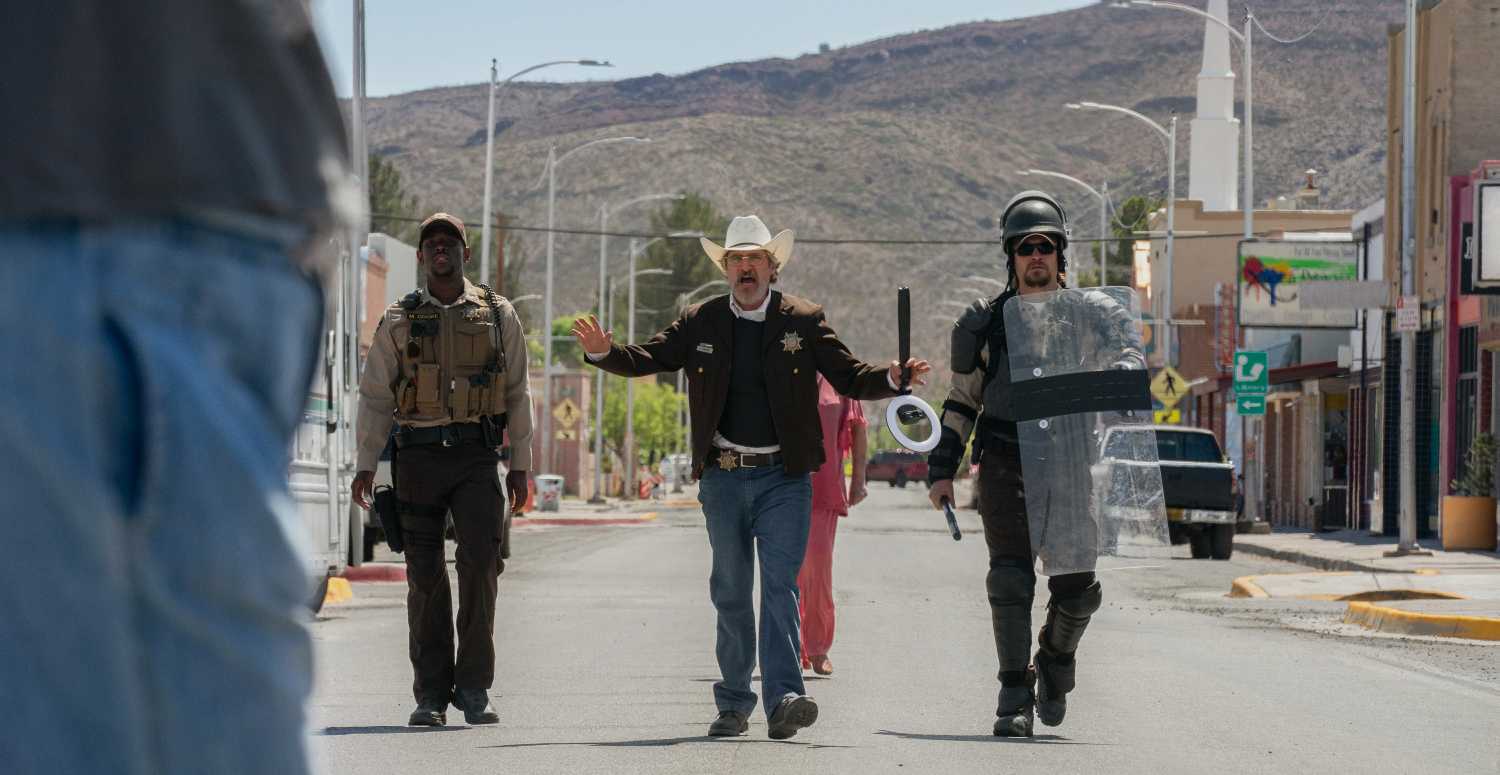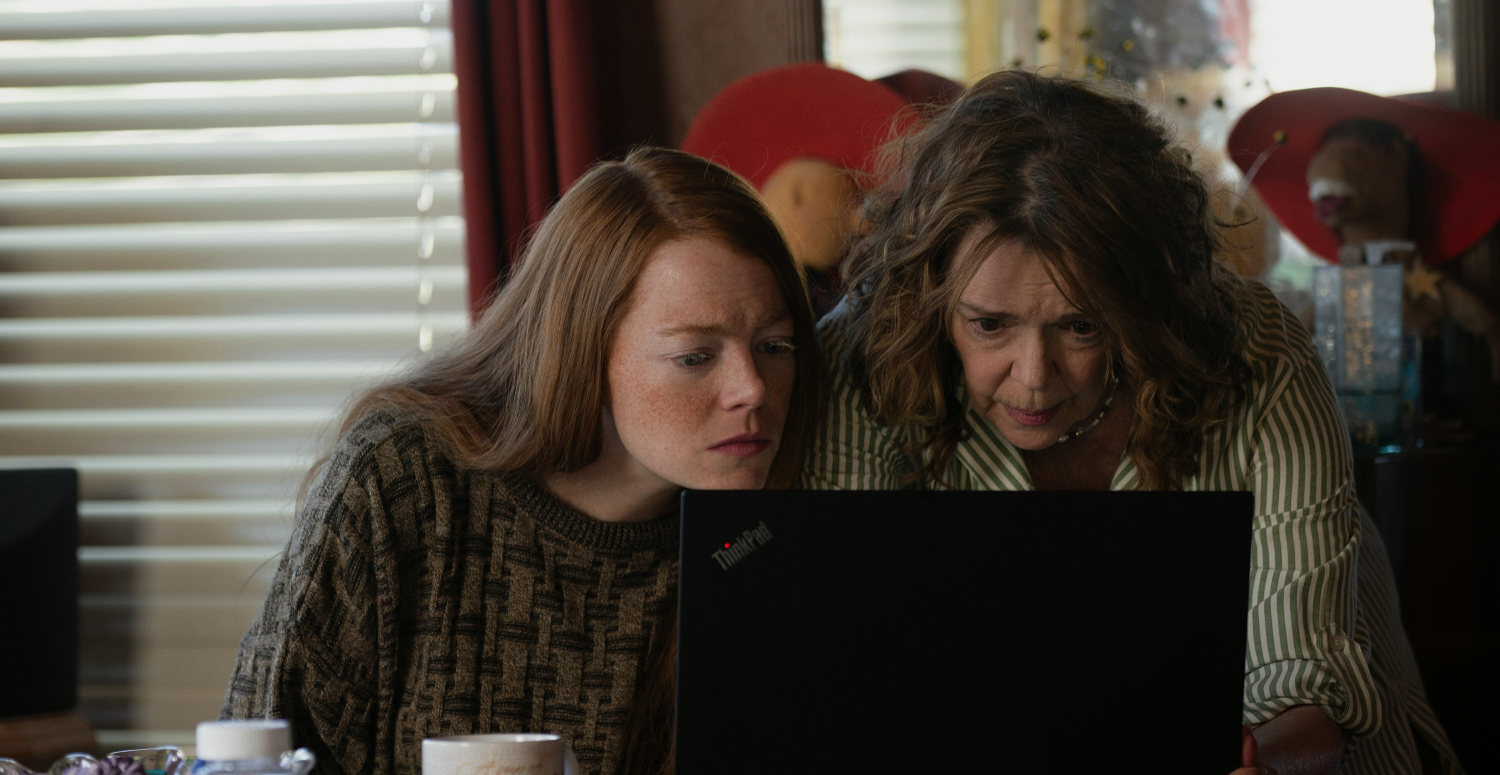Eddington
2025

FR EN
Eddington, c’est cette petite bourgade (fictive) du Nouveau-Mexique où, même au pic de la pandémie de covid-19 en mai 2020, peu de choses semblent se passer. Jusqu’à ce qu’une simple idée du shérif du coin et qu’une série d’autres évènements locaux comme nationaux a priori sans lien fassent tout vriller.
Quatrième long-métrage d’Ari Aster après le troublant « Hérédité », l’excellent « Midsommar » et l’étonnant « Beau Is Afraid », « Eddington » s’inscrit plutôt dans la lignée décalée mais non horrifique du troisième film du réalisateur, à la différence près qu’ici la kyrielle de péripéties et rebondissements paraît étrangement et terriblement vraisemblable.
Avec une multitude non exhaustive de thématiques et de sous-intrigues portées chacune par un ou plusieurs personnages (le shérif se réduisant par moments à un simple fil rouge au profit d’autres protagonistes), « Eddington » forme un concentré explosif de la complexité des fractures socio-économico-politiques des États-Unis d’Amérique. C’est un film qui dénonce avec amertume et violence l’hyper-individualisme d’une société infiniment divisée en une pléthore de bulles cognitives, où les ambitions personnelles s’entremêlent à des peurs, des traumatismes et des paranoïas qui nourrissent des idéologies fragmentaires, le tout créant alors une immense dissonance et une aberrante désunion de la population. L’on sent bien certes qu’il y a une légère exagération des comportements et discours à des fins scénaristiques, mais lorsque l’on y réfléchit, la ville d’Eddington n’est en réalité que le reflet de tout un pays, voire de tout un monde, prêt(s) à s’embraser à n’importe quelle occasion d’étincelle.

Ainsi, des sympathisants ambivalents de Black Lives Matter aux récalcitrants anti-vax, de la galaxie des complotistes aux contradictions des écologistes, des dirigeants plus ou moins corrompus par les entrepreneurs incarnant un progrès douteux aux marginaux prêts à émettre des dénonciations calomnieuses à des fins revanchardes ou politiques, des gens esseulés par la maladie ou la vieillesse aux gourous néo-sectaires, « Eddington » n’épargne personne.
Toutefois, malgré un casting de renom (Joaquin Phoenix, Pedro Pascal ou encore Emma Stone, pour ne citer qu’eux) et un fond particulièrement marquant – et d’ailleurs en raison de cette même richesse – le film pâtit d’une arythmie comparable à celle de « Beau Is Afraid ». « Eddington » entremêle certes avec finesse toute une panoplie d’enjeux expliquant de fait le fatras qu’est une société aussi morcelée, mais cela s’accompagne de longueurs ou à l’inverse de rapides changements de registre quelquefois difficiles à assimiler. De sorte que l’on retient bien plus le fait que le long-métrage soit bordélique narrativement que happant visuellement ou cinématographiquement. En somme, nonobstant un récit indéniablement cohérent et actuel, le style sporadique d’« Eddington » ne frappera ni ne conquerra tout le monde.
Eddington is a small (fictional) town in New Mexico where, even at the peak of the covid-19 pandemic in May 2020, little seems to be happening. That is, until a simple idea from the local sheriff and a series of other seemingly unrelated local and national events throw everything into turmoil.
Ari Aster’s fourth feature, after the unsettling “Hereditary”, the brilliant “Midsommar” and the bewildering “Beau Is Afraid”, “Eddington” follows in the quirky but non-horrific footsteps of the director’s third film, except that here the slew of twists and turns seems strangely and frighteningly plausible.
With a non-exhaustive plethora of themes and subplots, each conveyed by one or more characters (the sheriff at times being reduced to a mere supporting role in favor of other protagonists), “Eddington” provides an explosive concentration of the complexity of the socio-economic-political divides in the United States of America. It’s a film that bitterly and violently denounces the hyper-individualism of a society infinitely fractured into a plethora of cognitive bubbles, where personal ambitions intermingle with fears, traumas and paranoias that feed fragmented ideologies, all of which then create tremendous dissonance and abysmal disunity among the population. There’s a slight exaggeration of behavior and discourse for the sake of the script, but when you think about it, the town of Eddington is really just a reflection of an entire country, or even an entire world, ready to ignite at any given opportunity.

So, from ambivalent Black Lives Matter sympathizers to stubborn vaccine-deniers, from the galaxy of conspiracy theorists to the contradictions of eco-activists, from leaders more or less corrupted by entrepreneurs embodying dubious progress to outsiders ready to issue slanderous accusations for vindictive or political ends, from lonely folks afflicted by illness or old age to neo-sectarian gurus, “Eddington” spares no one.
However, despite a stellar cast (Joaquin Phoenix, Pedro Pascal and Emma Stone, to name but a few) and a particularly striking storyline – and in fact due to this very substance – the film suffers from an arrhythmia comparable to that of “Beau Is Afraid”. Although “Eddington” cleverly interweaves a whole range of issues to explain the hodgepodge that is such a fragmented society, this is coupled with lengthy or, conversely, rapid changes of tone that are sometimes difficult to digest. As a result, the film’s messy narrative is far more memorable than its visual or cinematographic qualities. In short, despite an undeniably coherent and topical narrative, the sporadic style of “Eddington” will neither strike nor win over everyone.
Axel Chevalier

